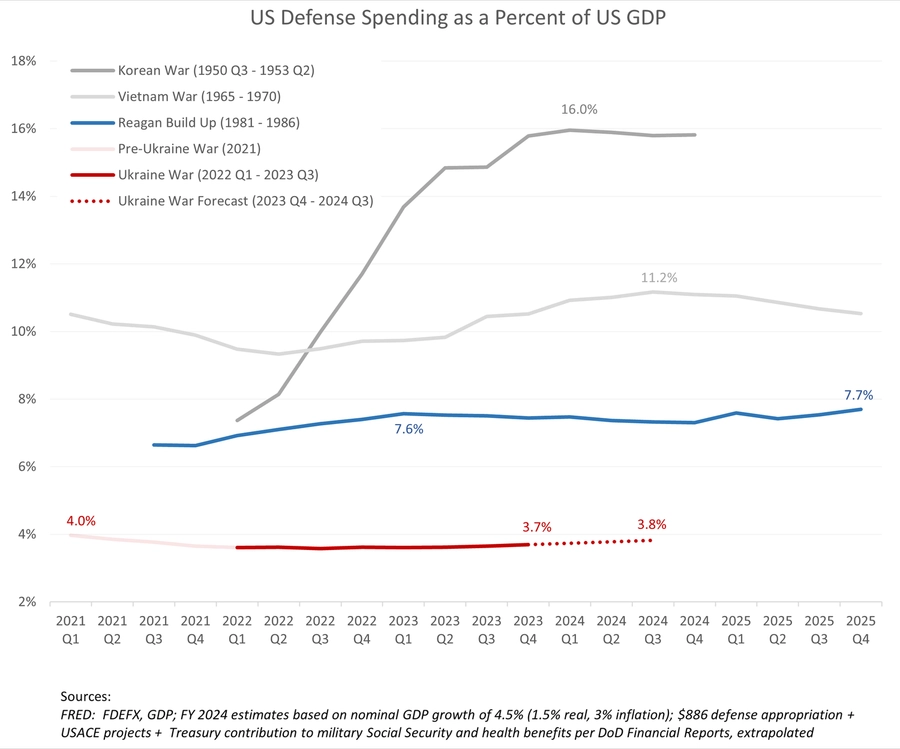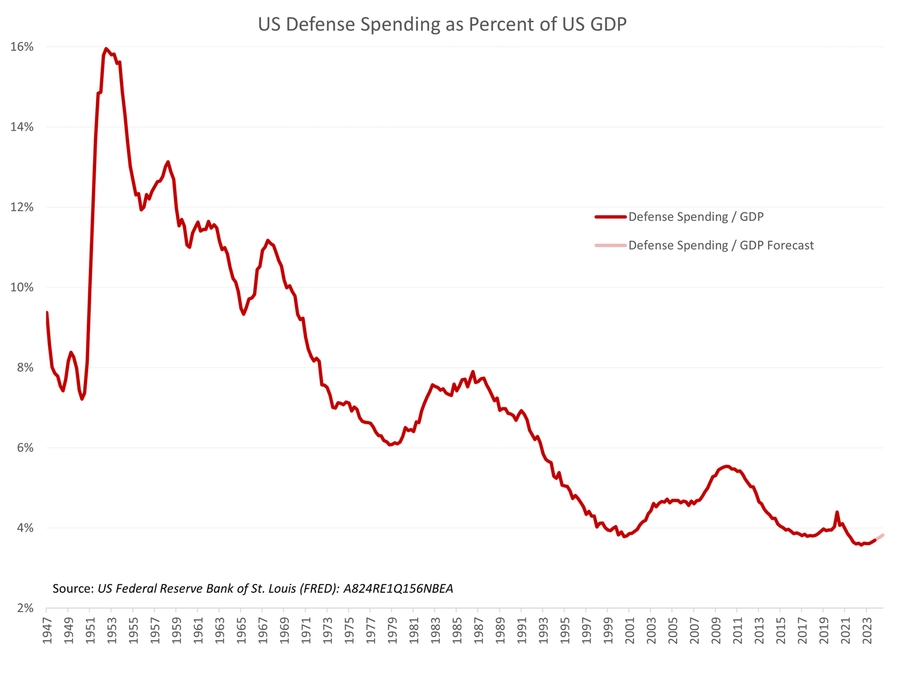Reading the press, one might think US defense spending has reached astronomical heights. Take, for example, Barrons' latest piece on the topic, US Congress Passes Huge $886 Bn Defense Budget For 2024. One would think that the US is all in for some cataclysmic battle.
Not even close.
JOIN US ON TELEGRAM
Follow our coverage of the war on the @Kyivpost_official.
Under the Biden administration, defense spending as a share of GDP has fallen to its lowest level since before World War II. The Fiscal Year 2024 Defense budget does raise spending as a share of GDP marginally, but to a level essentially tied for the lowest in the last 84 years with the 'peace dividend' during the Clinton administration. In fact, defense spending in 2024 will be a smaller share of GDP than it was before the Ukraine war began.
The comparison with earlier conflicts is even more stark.
During the Korean War (1950-1953), the US spent at peak 16% of GDP on defense, more than four times the current share.
During the latter stages of the Vietnam War, defense consumed 10% of GDP, three times the current level.
And during the Reagan administration, when the US was spending the Soviet Union into bankruptcy, defense outlays represented 7.6% of GDP, more than twice the current share.
Indeed, if we took the Ukraine war as seriously as the Korean War, then we would be willing to spend more than $4.4 trillion on defense, comfortably twice Russia's entire GDP.
Instead, US defense spending eroded to 3.6% of GDP in 2023 from a lowly 4.0% before the Ukraine war. The new defense budget raises spending marginally, to 3.8% of GDP, but remains the lowest share in the last 84 years, barring only the prior two years of the Biden administration.

‘Europe Must Stand Up’ – EU Lawmakers Clash Over Trump’s Return, Musk’s Political Meddling
Thus, given the perilous state of global security, defense spending stands at irresponsibly low levels and represents more mockery of, than commitment to, national security. To suggest that the US cannot afford to fund the war against Russia, that somehow, we are tapped out and compelled to take a loss in Ukraine, is flatly untrue. Defense has been pathetically neglected under the Biden administration.
If I view the numbers as an analyst, a bump in defense spending to 4.6% of GDP looks warranted under the circumstances. This would represent an additional $225 bn in 2024 to prosecute the Ukraine war, among others. Putin cannot match that. Russia's pre-war military budget was a mere $66 bn, rising to $140 bn for 2024, representing 35% of total government spending in Russia this year. Putin's discretionary war in Ukraine, one which he could stop tomorrow without harm to Russia, is squeezing out non-military programs, including social spending. The Russian public will not be happy.
This much is clear: The US is strong. Our military potential is not exhausted, it's untapped. It is our political potential that is exhausted. There is a lack of seriousness in Washington. The Biden administration appears to be playing at war rather than knuckling down and winning it.
Meanwhile, Congressional Republicans seem ready to abandon national security. Behind all this is the notion that projecting weakness and indecision will translate into perceptions of strength and political popularity. If only our politicians show sufficient hesitation, lack of conviction, and subservience to Moscow, US voters will love them. It's a model of leadership through capitulation.
President Reagan spent twice as much on defense as a share of GDP as we are, and Reagan did that at a time when we were not involved in a major conflict with the Soviet Union. This policy bankrupted the Soviet Union and represents one of the crowning achievements of the Reagan administration.
We can easily do that again. A 1984 CIA analysis estimated the US economy at the time to be twice the size of the Soviet Union's. Today, the US economy is 5-14 times the size of Russia's, depending on the metric used. If the US is serious, Russia cannot keep pace, and Putin knows it.
It comes down to intent. President Biden may not be willing to lead on this. But House Speaker Mike Johnson can. If he says, "The US is not going anywhere," and backs it up with some serious money, then we'll know where to find real leadership in Washington.
Steven Kopits heads Princeton Policy Advisors. A strategic management consultant and investment banker, he writes frequently on policy topics for a variety of publications, including Foreign Policy and The National Interest, and is a regular contributor to CNBC and The Hill.
This article is reprinted from Princeton Policy Blog. See the original here.
The views expressed in this opinion article are the author’s and not necessarily those of Kyiv Post.
You can also highlight the text and press Ctrl + Enter












